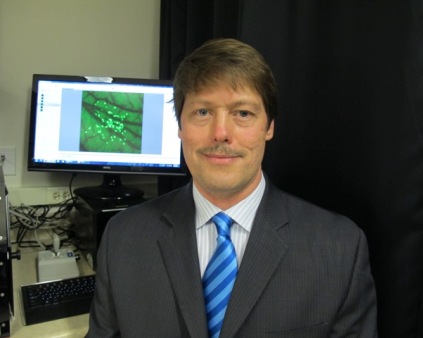Nov 21 2012
A medical researcher with the University of Alberta and his team just published their findings about their work on developing 'homing beacon drugs' that kill only cancer cells, not healthy ones, thanks to nano-technology.
 John Lewis
John Lewis
John Lewis, the Frank and Carla Sojonky Chair in Prostate Cancer Research with the Faculty of Medicine & Dentistry, published his findings in the peer-reviewed journal, Nano Letters. He is also an associate professor in the Department of Oncology, a Fellow with the National Institute for Nanotechnology at the U of A and director of the Translational Prostate Cancer Research Group.
Lewis noted chemotherapy goes through the body and kills any cells that are dividing, even healthy ones – which is why cancer patients have immune system problems, hair loss, nausea and skin problems.
"We are developing smart drugs that determine which are the cancer cells and which aren't, then selectively kill only the cancer cells. The drugs look for a protein that is only found in cancer cells, not normal cells. This system acts like a homing beacon for tumours."
These drugs, tested to date in only animal lab models, could be used within a week of cancer diagnoses, predicts Lewis. The drugs would target cancerous cells throughout the body – attacking sneaky cancer cells that have already escaped and grown outside the site of the main tumour.
Lewis wasn't sure when these homing beacon drugs could be available for physicians to use with patients, but hopes his works paves the way for patient-centered therapies.
"If we can use 'smart' drugs that home in on tumours, we can dramatically decrease side effects for patients, lower the chance of recurrence, and hopefully increase the cancer survival rate."
Meanwhile, Lewis and his research team are continuing their work on trying to figure out what causes cancer cells to escape and spread from the main tumour site because the cells that move are different than the ones in the main tumour. They have pinpointed numerous genes that set these 'moving' cancer cells apart from the ones that stay put. Based on this research, they have come up with a drug that uses a 'tumour glue' to prevent these moving cancer cells from breaking apart from the main tumour, which prevents the spread of the cancer. Using knowledge gained from the 'tumour glue' drug, Lewis and his team are working to develop new blood tests to predict whether prostate and other cancers will spread.